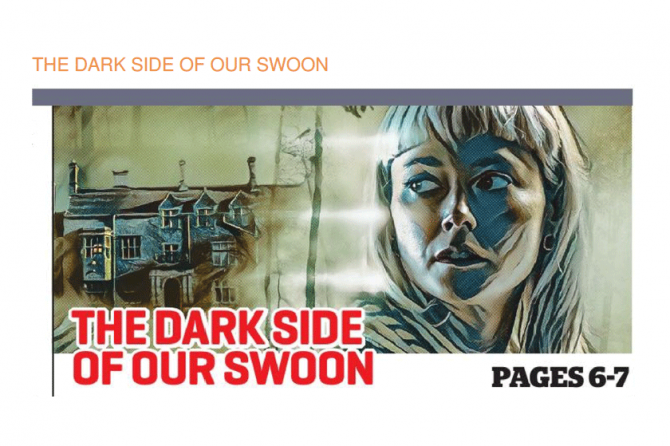
The Psychology of Binge Watching Dark Movies – Dubai Psychologist, Dr. Alfred, in Khaleej Times
Murky, unsettling landscapes. Damaged minds. Ghosts that need to be exorcised. AND Crimes that have no formulaic black-and-white answers. Why are we bingeing on a web of moral ambiguity being spun on our screens?
It was Netflix’s House of Cards that set the trend for me. Bingeing on way too much evil, too many twisted back alleys. I remember a friend telling me how he and his wife had got up, on reflex, from their sofa — in front of their TV set — and screamed and pleaded with (an unhearing) Peter Russo to not fall for the trap laid out for him by Frank Underwood. “You will die, he’s planning to kill you, don’t leave the house!” […]
‘Crime shows are making us relate to moral ambiguity’
As human beings, we don’t only have good thoughts — we have secret dark thoughts: the much-debated phenomenon of schadenfreude. And even though we may feel guilty about harbouring such thoughts, we can easily connect to an ambience of moral ambivalence, which is what dark crime shows encapsulate. “They somehow make things seem more real — let’s face it, modern life is like that: complex,” says Mayank Tewari, a former journalist, and scriptwriter of Newton — that was selected as the Indian entry for Best Foreign Language Film at the 90th Academy Awards — and the upcoming Season 2 of the critically-acclaimed Delhi Crime.
We live in strange times, and by that Mayank is not referring to Covid times per se. “This is the age of the Internet and social media, the cap is coming off everything, and we are witnessing a loss of innocence.” He gives an example. “When I was growing up in 1980s’ and 1990s’ India, I just believed — in good faith — that the government wants to do good things. These days, youngsters don’t think like that because they know everyone has their own motives, their own design.”
Popular culture reflects that. “Take ‘true love’: earlier, it would be portrayed as a romantic ideal, but these days you get to see that in real relationships there has to be constant engagement — not entanglement — and yet you have to give your partner space.” Space as a construct between a couple used to be an alien concept — on screen. “Not anymore.”
Consequently, we relate to moral ambivalence. “We root for the villainous protagonist in Breaking Bad. We cannot relate to the likes of Hardy Boys and Nancy Drew — we need ambiguity to put characters in context.” When a crime show has a ‘damaged’ detective with dark secrets, it humanises him (or her). “The character has flaws, failings, problems… in fact, the ‘villain’ could, at some point, turn around and tell him/her, ‘Hey, you are just like me’, and we wouldn’t bat an eyelid.” He says he’s been watching the new series on serial killer Charles Sobhraj, and it’s incredible how his character — which is supposed to be ridden with moral turpitude — “is humanised and you end up relating to him”.
During lockdown, people — the consumers — stayed indoors for the most part, watching a lot of television. Obviously, they gravitated towards shows with equivocacy. Advocates of “wholesome viewing” could well ask why “dark matter” is finding its way onto “entertainment” platforms. “With streaming, there has been a democratisation of content in the real world,” points out Mayank. “Video-on-demand networks are open to experimentation, even if it’s for a small target group.” Conventional feel-food is making way for edginess because there are takers.
Women have a lot of agency in these shows, he adds, since myriad feminist themes are being brought out: they may be violent in format, but they get conversations going in areas that were always glossed over earlier. “I’d say it’s been an era of empowerment for viewers.”
‘This train wreck will never personally affect us’
“We are generally intrigued by crime that is convoluted,” says Maria Waqar, US-based scholar of gender and politics. She recently started rewatching Breaking Bad, and admits she’s “hooked” all over again. But for a very different reason than Mayank’s. According to Maria, there’s a certain comfort in watching complex crime stories unfold behind the screen, from the safety of your home. “Given that the pandemic, with its apocalyptic overtones, made people feel insecure and unsafe, they binged on thrillers showcasing deviant crimes. Amid so much uncertainty and distress, it may be psychologically comforting to know that this ‘trainwreck’ will never personally affect them.”
In a way, she echoes a snatch from Kathryn VanArendonk’s vulture.com gripping exposition: “Turning crime on and off feels powerful and soothing. It is a way to see the darkest parts of humanity while also being assured of your own safety. Because when you watch crime on TV, you’re not out there being murdered or robbed or violated by some terrifying, unknowable evil. You’re at home, on your sofa, sitting in front of your television.”
But, here too, there are nuances — at times, complex, gritty ones.
“In the genre of noir, right and wrong are unclearly defined and protagonists are often self-destructive and morally questionable,” notes Alfred Gull, clinical psychologist at German Neuroscience Center, Dubai. He compares the “landscape” to that of the pandemic. Despite precautionary measures, we often do not know what will happen next or even what is right or wrong. “As in the movies, unexpected changes/shifts like mutant viruses happen and the world needs to adapt.”
“There are some theories that try to explain the fascinating phenomenon of the dark genre. One of them says that these kind of stories with unexpected shifts and seriously flawed protagonists teach viewers resilience and how to live with fear. Further, they illustrate that life isn’t always easy, and it’s okay to be scared.” […]
The full and original article was published in Khaleej Times

